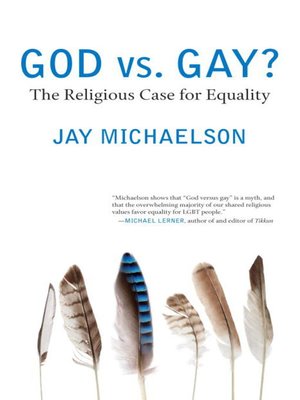
Sign up to save your library
With an OverDrive account, you can save your favorite libraries for at-a-glance information about availability. Find out more about OverDrive accounts.
Find this title in Libby, the library reading app by OverDrive.



Search for a digital library with this title
Title found at these libraries:
| Library Name | Distance |
|---|---|
| Loading... |
A passionate argument for LGBTQ equality within religious communities—“a book for our times and a book for the ages” (EDGE)
The myth that the Bible forbids homosexuality—the myth of “God versus Gay”—is behind some of the most divisive and painful conflicts of our day. In this provocative and game-changing book, scholar and activist Jay Michaelson shows that the Bible does not prohibit same-sex intimacy but does quite the opposite. In fact, the vast majority of the Bible’s teachings support the full equality and dignity of LGBTQ people, from the first flaw it finds in creation (“It is not good for a person to be alone”) to the way religious communities grow through reflection and conscience. Michaelson argues passionately for equality—not despite religion, but because of it.
With close readings of the Hebrew Bible and New Testament, the latest data on the science of sexual orientation, and a sympathetic, accessible, and ecumenical approach to religious faith, Michaelson makes the case that sexual diversity is part of the beauty of nature. The recognition of same-sex families will strengthen, not threaten, the values religious people hold dear. Whatever your views on religion and sexual diversity, God vs. Gay is a plea for a more compassionate, informed conversation—and a first step toward creating one.
The myth that the Bible forbids homosexuality—the myth of “God versus Gay”—is behind some of the most divisive and painful conflicts of our day. In this provocative and game-changing book, scholar and activist Jay Michaelson shows that the Bible does not prohibit same-sex intimacy but does quite the opposite. In fact, the vast majority of the Bible’s teachings support the full equality and dignity of LGBTQ people, from the first flaw it finds in creation (“It is not good for a person to be alone”) to the way religious communities grow through reflection and conscience. Michaelson argues passionately for equality—not despite religion, but because of it.
With close readings of the Hebrew Bible and New Testament, the latest data on the science of sexual orientation, and a sympathetic, accessible, and ecumenical approach to religious faith, Michaelson makes the case that sexual diversity is part of the beauty of nature. The recognition of same-sex families will strengthen, not threaten, the values religious people hold dear. Whatever your views on religion and sexual diversity, God vs. Gay is a plea for a more compassionate, informed conversation—and a first step toward creating one.







